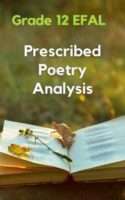There is no copy available of this poem online.
This lovely and lyrical poem is celebrating the ‘voices of the land’ – so not only languages and people, but places, times, and experiences that are in many ways uniquely South African. The poet is encouraging us all to understand each other, and the place we live in.
The poet uses many words that refer to sound and language. He describes the ‘inarticulate grunt’ (a sound before language perhaps – inarticulate means unable to express things easily), and then the ‘stammer, call, cry, babble’ – all of these sounds that are in all languages, or no languages – just the sounds we make as babies. And perhaps he is hinting at the unity behind language when he says ‘a sense of the stoness of these stones from which all words are cut’. So our words may be different but they are expressing the same meaning, the same humanity.
You will notice in the above images that he intertwines words used to describe or analyse language with descriptions of land, like ‘stones’ and the ‘cut’ of words. He does this throughout the poem. Here are some examples:
– We are called on ‘to parse the speech in its rivers’. Parsing is a term used to analyse language, and here we are called on to use it in understanding South Africa’s rivers – so he is extending the idea of analysing language to understanding the land.
– He talks about how to ‘trace with the tongue wagon-trails’ – so comparing making sounds in our mouth with the trails of wagons. Wagons were used by early Afrikaans setters who trekked across the country.
– He compares the full moon that drums …it’s cow-skinned vowel’. A drum is ‘cow-skinned’, and a vowel is a sound, and here he mixes them in his description.
– ‘Syllables born in tin shacks’ – syllables are parts of words, and many South Africans live in shacks.
He also refers to many uniquely South African words and sayings in the poem:
-kuil, -pan, -fontein – these, as he says, are suffixes – how many place names do you know of that end with them? They are from Afrikaans, and all refering to water, reflecting the Afrikaans trekkers’ need to find water in this dry land.
Then he refers to South African slang and dialect:
– I’m telling you (a common SA phrase)
– Stompie – cigarette butt (or short person)
– Stickfast – to get stuck (like the Afrikaans steek vas, perhaps)
– Golovan – a trolley used in the mines
– Songololo – worm, centipede
– Just boombang – colloquial language and onomatopoeia – something happened fast
– ikwata bust fife – this is a quarter past five – he is writing it as people say it
– chwannisberg train – Johannesburg train – again he is writing it as he is saying it
By using these colloquial, South African terms he is celebrating real people’s lives, not the way we ‘should speak, but the way we do.
There are also more mysterious images that he uses to describe the land – he mentions a ‘planetarium’, the ‘pectoral beginning to the nub of time’ – what is the poet referring to there? Is it the dome of the earths’ chest, where everything begins? Different readers have different interpretations.
Jeremy Cronin was imprisoned for fighting against apartheid. And his identification with the working class and oppressed is evident in the poem as he refers to ‘shacks’, and trains, and the golovan and finally the mine-gangs, as these words show that he is celebrating the language, the lives of South African miners and workers. And, at the end he hints at their strength and desire for change in the phrase simile the ‘mineral glow of their unbreakable resolve’. They are mining for minerals, but here the glow is not the minerals, but their strength and determination to rise up against oppression. (But don’t forget his mention of wagon-trails, and Afrikaans place names – he is not advocating one ‘voice’ but many voices…)
The magic of the poem is in how the words are threaded together, and this poem is not a lecture! It is a celebration, a song – notice the repetition of the infinititive, all the things we need to do – ‘to learn’, ‘to parse’, ‘to catch’, ‘to trace’, ‘to visit’, ‘to bury’, ‘to write’, ‘to understand’, ‘to voice’. The infinitive is a way to make this an active process, and he is uniting all of us in this venture of learning how to speak with the many voices of the land. He opens with these words, and closes with almost a repetition: ‘To learn how to speak with the voices of this land’ so they echo in our mind as his main call to action.


